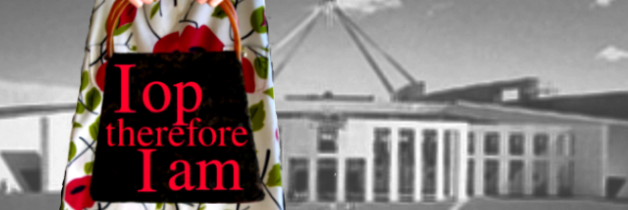From Sydney Morning Herald, January 24, 2009
Op shops the latest casualties of corporatisation
by Joel Gibson
If the little old lady at the op shop has appeared to be frazzled of late, spare a thought.
She may be grappling with branding strategies, occupational health and safety dicta and Pantone colour codes.
Intense rivalry in an industry worth more than $100 million in NSW has brought a new professionalism to charity stores, raising extra money for their programs while endangering their frumpy, amateur ethos.
The St Vincent de Paul Society began tidying its brand a decade ago, its chief executive, John Picot, said: buying blue carpet in bulk, adopting Pantone Reflex Blue as its common hue and agreeing after a three-year debate to give in to the Australian abbreviation "Vinnies".
An 84-page national style and identity guide was published in 2005 and centres of charity (the word "shop" still jarred) were given three years to conform.
"We immediately recognise the golden arches as the symbol for McDonald's, while the five coloured rings signify the hope and excitement of the Olympic Games," it explained. "It is just as important that a person seeking the society's help recognises our centres or special works by the hands represented in our logo."
Vinnies centres are now open on Sundays and Thursday nights. The Salvation Army has stopped short of Sunday trading, but it began adopting corporate uniforms in its rebadged Salvos Stores five years ago.
"We led the charge, there's no doubt about that," said its chief executive, Neville Barrett. "It's a competitive market … we need to find ways of engaging customers to come back to us so we have a competitive advantage."
It worked. Mr Barrett said takings were up about 10 per cent in the past four years, and 20 per cent in recent months. The Salvos earn $35 million to $40 million from stores in NSW; Vinnies - reportedly the second-largest retailer in Australia after Woolworths - topped that with $46 million in 2006-07.
"C" words remain uncouth in the new-look stores. "We haven't in fact coined a term for it," Mr Picot said. "Corporatisation or commercialisation - neither of those are words we would ever want to use, they don't strike a chord with our volunteers."
It was too much for some volunteers, who left rather than be "McDonaldised", as one put it.
Les Mico, a Vinnies insider and critic, said people were trained to ask, "Do you want trousers with that?"
"There was some flak …and we probably lost a few very good volunteers but we've had more come on and some have filtered back," Mr Barrett said. "We are a charitable organisation but we also need funding to generate for the mission of the Salvation Army. We need to sell things."
Mr Picot said Vinnies' volunteers had done a good job in the past but the world was now more regulated. Use of tea towels is now banned for occupational health and safety reasons, for example, and a policy to refer the poor to welfare officers is being enforced, whereas before, some were given clothing on the spot.
"[People] do get set in their ways and many of our volunteers are older people and they're less likely to embrace change, perhaps, than younger people."
The majority, though, have shown the patience of Job.
At Rozelle, a six-year Vinnies volunteer, Irene Snell, 70, said she had hardly noticed the changes. "I like the camaraderie and it's a good cause," she said. "Everything changes, doesn't it? We're stayers. We wouldn't keep going if we didn't believe in the cause and enjoy it."
Discuss.

1 comment:
Hmmmm
Just don't know what to think. I understand their needs, and changes, but I don't have to like it do I?
I want to rummage, and find a bargain.
Janet
Post a Comment